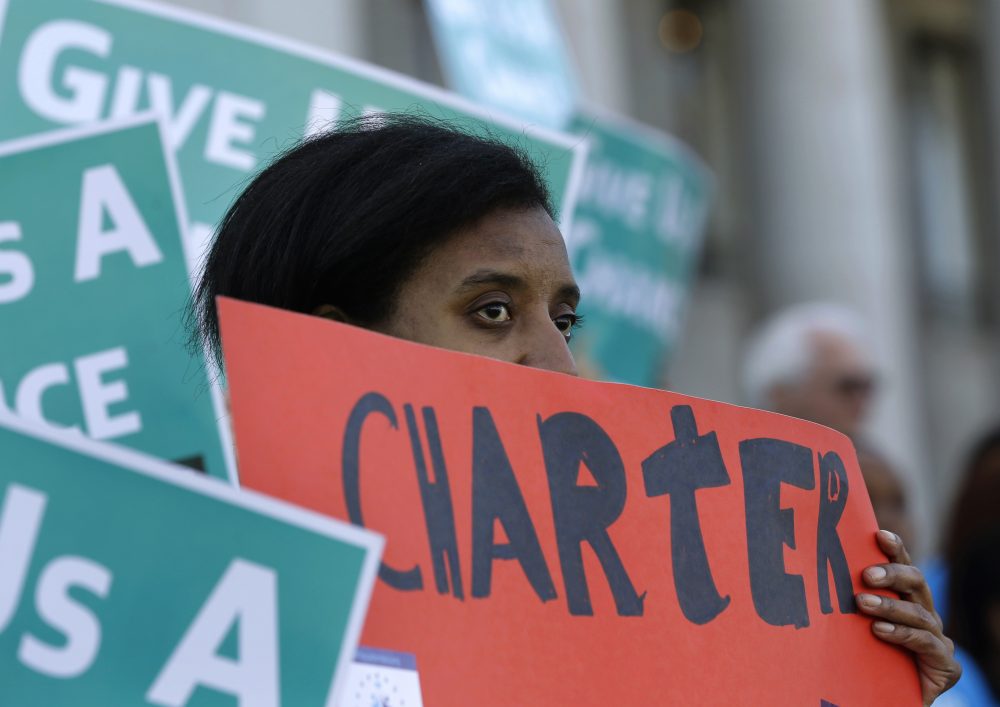Advertisement
A Closer Look At The Debate Over Charter Schools
Resume
On Nov. 8, Massachusetts voters will decide whether the state should lift its cap on charter schools. Debate on the ballot measure has been fierce, underscoring a rift amid education reformers across the country.
According to the Department of Education, 42 states and the District of Columbia have passed charter school legislation, as of the 2013–14 school year. And while charter schools have grown rapidly in the last 10 years, just 6.6 percent of public schools were public charter schools in 2013-14.
As controversy continues over charter schools in the United States, Here & Now's Jeremy Hobson dives into the debate with Michelle Rhee, who ran Washington's public schools from 2007 to 2010, and Kevin Welner, director of the National Education Policy Center at the University of Colorado at Boulder.
Interview Highlights: Michelle Rhee & Kevin Welner
On what could improved about public charter schools
Kevin Welner: "I think there are improvements in the area of access, improvements in the area of accountability, improvements in the area of transparency. I think finding ways to make them work better within a system so that they help, not hurt, other public schools around the charter schools. All those things can be done and can be changed."
On whether charter schools draw resources away from public schools
Michelle Rhee: "I think that they draw the resources that they should. They are serving kids who deserve to have the public dollars following them. Traditional school districts shouldn't be getting money and dollars for kids that they're not serving. I think that everyone would agree with that. I think the challenge is that a lot of traditional public school districts have fixed costs that they have to deal with, in terms of capital expenditures and that sort of thing. And when kids start to leave, those costs don't actually go down.
So helping districts figure out how they deal with that dynamic is incredibly important. But I don't think that traditional public school districts should be getting money in the door for kids that they are not serving. I also don't think we should be forcing families to send their kids to a traditional public school if it's actually not working for them."
Welner: "The nature of the system, of course. But that's not necessarily a bad thing. I think we have to design the system to minimize any problems. Essentially, if you're creating two parallel systems, you're creating inefficiencies..."
On transparency of public charter schools
Rhee: "...I think that there are some problem spots with for-profit companies — and that there have to be rules and regulations and policies in place to ensure that there is transparency in terms of where the dollars are going, how they're being spent. And furthermore, what impact those are having on kids.
So is there a problem? Yes, but I don't want to overstate the problem, because I do think that the vast majority of charter schools are actually run by non-profit organizations, and they do have requirements about making sure that any additional dollars that are coming in to this non-profit are disclosed. Could it be better than it is now, in terms of the transparency? Yes, absolutely. I think what has, in past, really provided the leverage and the pressure to make some of these changes is the fact that families are voting with their feet and they are choosing the charter schools more and more. So I think you have to have that pressure there, if you take that off, then what is the incentive for the existing status-quo to change itself? There really is none."
Guests
Michelle Rhee, former chancellor of Washington public schools, founder of Students First and a board member of 50CAN action fund. She tweets @MichelleRhee.
Kevin Welner, director of the National Education Policy Center and a professor at the University of Colorado at Boulder School of Education.
This article was originally published on October 13, 2016.
This segment aired on October 13, 2016.